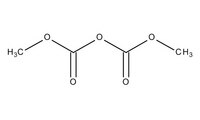818758 Sigma-AldrichDimethyl dicarbonate
Dimethyl dicarbonate for synthesis. CAS 4525-33-1, chemical formula (CH₃OCO)₂O.
More>> Dimethyl dicarbonate for synthesis. CAS 4525-33-1, chemical formula (CH₃OCO)₂O. Less<<Synonyms: Dimethyl pyrocarbonate, Pyrocarbonic acid dimethyl ester
Recommended Products
Overview
| Replacement Information |
|---|
Key Spec Table
| CAS # | EC Number | Hill Formula | Chemical Formula | Molar Mass |
|---|---|---|---|---|
| 4525-33-1 | 224-859-8 | C₄H₆O₅ | (CH₃OCO)₂O | 134.09 g/mol |
Products
| Catalogue Number | Packaging | Qty/Pack | |
|---|---|---|---|
| 8.18758.0100 | Glass bottle | 100 ml |
| Description | |
|---|---|
| Catalogue Number | 818758 |
| Synonyms | Dimethyl pyrocarbonate, Pyrocarbonic acid dimethyl ester |
| Description | Dimethyl dicarbonate |
| References |
|---|
| Product Information | |
|---|---|
| CAS number | 4525-33-1 |
| EC number | 224-859-8 |
| Hill Formula | C₄H₆O₅ |
| Chemical formula | (CH₃OCO)₂O |
| Molar Mass | 134.09 g/mol |
| HS Code | 2920 90 10 |
| Structure formula Image | |
| Quality Level | MQ200 |
| Applications | |
|---|---|
| Application | Dimethyl dicarbonate for synthesis. CAS 4525-33-1, chemical formula (CH₃OCO)₂O. |
| Biological Information |
|---|
| Dimensions |
|---|
| Materials Information |
|---|
| Toxicological Information | |
|---|---|
| LD 50 oral | LD50 Rat 335 mg/kg |
| LD 50 dermal | LD50 Rat > 1250 mg/kg |
| Safety Information | |
|---|---|
| Categories of danger | toxic, corrosive |
| Product Usage Statements |
|---|
| Storage and Shipping Information | |
|---|---|
| Storage | Store at +15°C to +25°C. |
| Packaging Information |
|---|
| Supplemental Information |
|---|
| Specifications | |
|---|---|
| Assay (acidimetric) | ≥ 97.0 % |
| Identity (IR) | passes test |
| Due to its specific melting range the product may be solid, liquid, a solidified melt or a supercooled melt. | |
| Global Trade Item Number | |
|---|---|
| Catalogue Number | GTIN |
| 8.18758.0100 | 04022536445021 |
Documentation
Dimethyl dicarbonate SDS
| Title |
|---|
Dimethyl dicarbonate Certificates of Analysis
| Product Number | Packaging | Specification | Lot Number |
|---|---|---|---|
| 8.18758.0100 | Glass bottle | PDF Specification Document |







